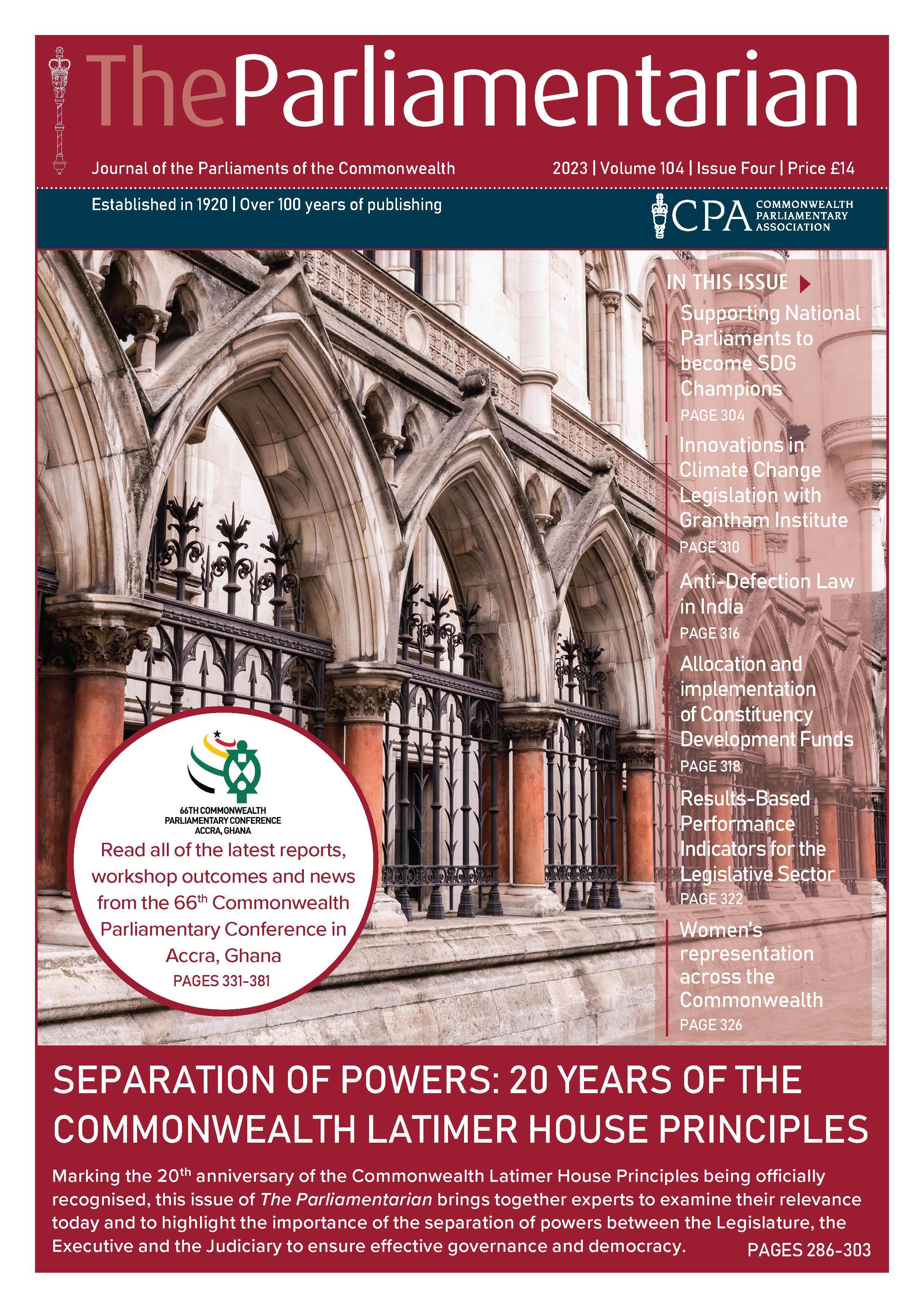Written by Hon. Robert French, AC, who served as Chief Justice of Australia (2008-2017) and is now Chancellor of the University of Western Australia.
This article was first published in The Parliamentarian (2023 Issue Four)
I am grateful for the opportunity to contribute to this celebration of the 20th anniversary of the Commonwealth (Latimer House) Principles on the Three Branches of Government in this issue of The Parliamentarian. I do so from an Australian perspective on the separate but interacting functions of the Parliament and the Judiciary in making laws and interpreting them.
Principle II of the Commonwealth Latimer House Principles states:
- ‘Relations between Parliament and the Judiciary should be governed by respect for Parliament’s primary responsibility for law making on the one hand and for the Judiciary’s responsibility for the interpretation and application of the law on the other hand.
- Judiciaries and Parliaments should fulfill their respective but critical roles in the promotion of the rule of law in a complementary and constructive manner.’
Under the Australian Constitution, Parliament makes the laws, the Executive government carries them out and the courts interpret and apply them in deciding cases brought before the courts. Chapter III of the Constitution provides for the federal court system, comprising the High Court, Federal Courts created by the Parliament, and State and Territory courts, which are given federal jurisdiction by the Parliament.
At the federal level, there is a clear separation of powers between the Legislature and the Executive on the one hand, and the Judiciary on the other. That separation is defined by a boundary between law making and adjudication which involves interpretation and application of the law. That boundary is not precisely defined. In the interpretation of laws, the courts are often required to make choices between available readings. The making of those choices can be seen as a species of interstitial law making.[i] However, the range of those choices is confined by rules of interpretation, institutional restraint, and respect for the constitutional function of the Parliament.
The interpretation of statutes is the core business for Australian courts in almost every kind of case they hear. In cases involving the exercise of challenges to official powers, the courts may have to determine the extent and limits of the powers which Parliament has conferred upon officials. The official whose decision is under judicial review may be a Minister of the Crown or a public officer or a body given statutory powers.
The courts may have to interpret the conditions which Parliament has prescribed must be satisfied before the decision-making power can be exercised. The courts may have to determine whether the conditions have been satisfied. It is central to the Rule of Law in Australia that there is no such thing as unlimited official power. Official action must be authorised by statute or directly from the Constitution. This is consistent with Principle VII(c) of the Commonwealth Latimer House Principles under the heading ‘Judicial review’ which states:
‘Best democratic principles require that the actions of governments are open to scrutiny by the courts, to ensure that decisions taken comply with the Constitution, with relevant statutes and other law, including the law relating to the principles of nature justice.’
What does a court do when it interprets a law?
When contested questions of the interpretation of an Act of Parliament come before the courts, there is often more than one possible interpretation reasonably open. A provision of an Act may present ‘constructional choices’ - different but reasonably arguable ways of reading the provision.
In deciding which construction to choose, Australian courts look first to the text of the Act - the words it uses. They also look to the context of those words - including the part of the Act in which the words are found, the other provisions of the Act and the overall legislative scheme of which they are part. They will also look to the purpose of the Act.
In Australia, the Acts Interpretation Act 1901 (Cth) requires the courts, interpreting Commonwealth statutes, to prefer ‘the interpretation that would best achieve the purpose or object of the Act whether or not that purpose or object is expressly stated in the Act.’[ii]
The purpose of an Act or a provision of an Act may be stated in the Act itself. It may be unstated but apparent from the Act read as a whole or from the terms of the particular provision. It may appear from the Minister’s Second Reading Speech and perhaps the Explanatory Memorandum for the Bill that becomes the Act. It may be that the Act gives effect to a recommendation of the Australian Law Reform Commission or a Royal Commission - a background which makes clear the legislative purpose.
Sometimes the purpose of a provision of an Act is obvious. Sometimes it is not. Sometimes the provisions of an Act reflect a political compromise between competing interests. That is democracy at work. However, it may make it difficult to determine a clear purpose. Complexity in the law is a challenge to the courts and to the public at large. The more complex a law is, the more difficult it can be to determine its purpose. Tax laws provide ample examples of that problem. In Australia, you know you face an interpretive challenge when the numbering of sections added into an already complex Act, use letters of the alphabet as well as numbers - e.g. section 107VZZH.
Complexity not only makes purpose hard to identify - a complex law may lack moral clarity. People may know they have to obey it or to accept its application, but not be able to understand what societal purpose it serves.
There are both statutory and common law rules which are applied by the courts in interpreting statutes. In Australia, there is a common law principle of legality which supports the interpretation of statutes in such a way as to avoid or minimise their impairment of common law rights and freedoms. Of course, that beneficial construction must be open and must be consistent with the purpose of the Act.
In two States and one Territory in Australia, there are Human Rights Acts which require the State and Territory courts to interpret statutes, so far as possible, consistently with human rights and freedoms of the kind set out in the International Covenant on Civil and Political Rights. This reflects Principle IV of the Commonwealth Latimer House Principles which includes the statement that:
‘The function of the Judiciary is to interpret and apply national constitutions and legislation, consistent with international human rights conventions and international law, to the extent permitted by the domestic law of each Commonwealth country.’
It has often been said that the interpretation of an Act should reflect ‘the intention’ of Parliament. However, a collective intention of Parliament is something of a fiction. Different members of Parliament voting for a law may have different understandings of it. Some may not have read the proposed law but relied upon an Explanatory Memorandum and/or the Minister’s Second Reading Speech. Indeed, given the complexity and volume of legislation today and the vast array of delegated legislation, which is laid before Parliaments for possible disallowance, it is simply too much to expect that individual Parliamentarians will be across all pieces of legislation for which they vote.
In interpreting a statute, the court does not first ascertain a parliamentary intention. The parliamentary intention is taken to be reflected in the interpretation that the court has adopted. In 2011, the High Court said of legislative intention that it is not an objective, collective mental state:
‘Such a state is a fiction which serves no useful purpose. Ascertainment of legislative intention is asserted as a statement of compliance with the rules of construction, common law and statutory, which have been applied to reach the preferred results and which are known to parliamentary drafters and the courts.’[iii]
There are those who argue that the intention of the Legislature is not a fiction and the view that it is a fiction is somehow anti-democratic. It is, however, preferable to interpret statutes with a real-world perspective. It is not helpful to rely upon an obviously false proposition that the court has somehow discerned a collective intention even if such a thing could be defined.
The purpose of the legislation expressly stated or otherwise implied, must be respected and applied to the choice the court makes between different meanings. Provided the courts stay within the guardrails of statutory and common law rules of interpretation, their decisions will be legitimate exercises of their function in a way that should not take parliamentary drafters by surprise. Sometimes of course, although not always, a provision is drafted in a way that really only allows for one interpretation consistent with the purpose of the law.
It is important for Parliamentarians and the courts to understand each other’s basic roles in making and interpreting the laws. It is important for Parliament to understand that the laws they make may carry unintended meanings when forensically examined in a contest before a court. Clarity of purpose is important. The courts have a responsibility to respect the limits of their own constitutional function. Interpretation may involve making choices between different possible meanings and in that limited sense, making the law. It should never amount to rewriting the law or interpreting it to obtain a desirable object inconsistent with the purpose of the law.
With mutual respect between the major institutions of government, public confidence in those institutions, which is vital to their continuance, can be maintained. When governmental institutions encroach impermissibly upon each other’s functions, public trust is undermined. The Commonwealth Latimer House Principles are perhaps more important today than ever before. As Principle X of the Commonwealth Latimer House Principles states:
‘Parliaments and governments should recognise the role that civil society plays in the implementation of the Commonwealth’s fundamental values and should strive for a constructive relationship with civil society to ensure that there is broader opportunity for lawful participation in the democratic process.’
References:
[i] This body of common law, sometimes called ‘interstitial common law’, includes judicial interpretation of the Constitution, of legislative statutes and of agency regulations, and the application of law to specific facts.
[ii] Acts Interpretation Act 1901 (Cth) s 15AA.
[iii] Lacey v Attorney-General (Qld) (2011) 242 CLR 573 (footnotes omitted).
Return to the CPA blog series: 'Commonwealth Latimer House Principles 20 Years On: 'Power of Parliaments'
Follow the CPA on social media to continue the discussion.





